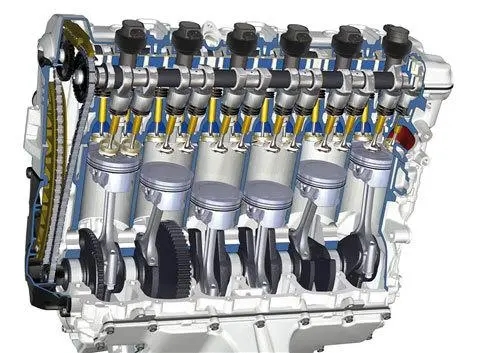
1. Lubrication effect. Engine oil can form an oil film between parts and reduce surface wear of the parts.
2. Cooling effect. Engine oil is a flowing liquid that, as it flows, can take away the heat generated by friction from the parts, providing good heat dissipation and preventing damage to the parts due to high temperatures.
3. Cleaning effect. Flowing engine oil can remove dust and other foreign objects from the atmosphere, maintaining a certain level of cleanliness between parts and preventing excessive wear between them.
4. Anti rust effect. The oil film formed by engine oil can isolate the corrosion of air and water on parts, thus playing a role in rust prevention.
5. Sealing effect. The oil film formed by engine oil can prevent air leakage and has a certain sealing effect.
What is a lubrication system? How does it work?
The so-called lubrication system refers to the collective term for various components and lubricating oil that provide lubrication for the engine. During continuous operation of the engine, the lubrication system is responsible for delivering a sufficient amount of oil at a suitable temperature to the surface of the transmission components and forming an oil film. The oil film can reduce friction between components, reduce power loss, and thus improve the working efficiency and durability of the engine.
What are the main components of the lubrication system?
According to the specific usage conditions of mechanical equipment, there may be slight differences in lubrication systems, but there are several main components that cannot be omitted, such as hydraulic pumps, filters, cooling devices, oil tanks, heating devices, sealing devices, oil pressure sensors, alarm devices, etc.
Oil plays an important role in the entire lubrication system and is the blood of the engine. So how should oil be selected?
1. Check the viscosity of the fuel. There are many brands of engine oil on the market. In fact, choosing engine oil mainly depends on its viscosity. The smaller the number before W, the lower the viscosity of the engine oil, which means better fluidity at low temperatures. The larger the number after W, the higher the viscosity and the higher the suitable temperature.
2. Based on the usage of the vehicle, if it is a new car and all engine components need to be run in, it is recommended to choose oil with lower viscosity. If the engine components have already worn out after driving the vehicle for a long time, it is recommended to use oil with higher viscosity.
3. The quality of different brands of engine oil may vary slightly, and can be selected based on the specifications, viscosity, and other parameters required by the vehicle's maintenance manual.